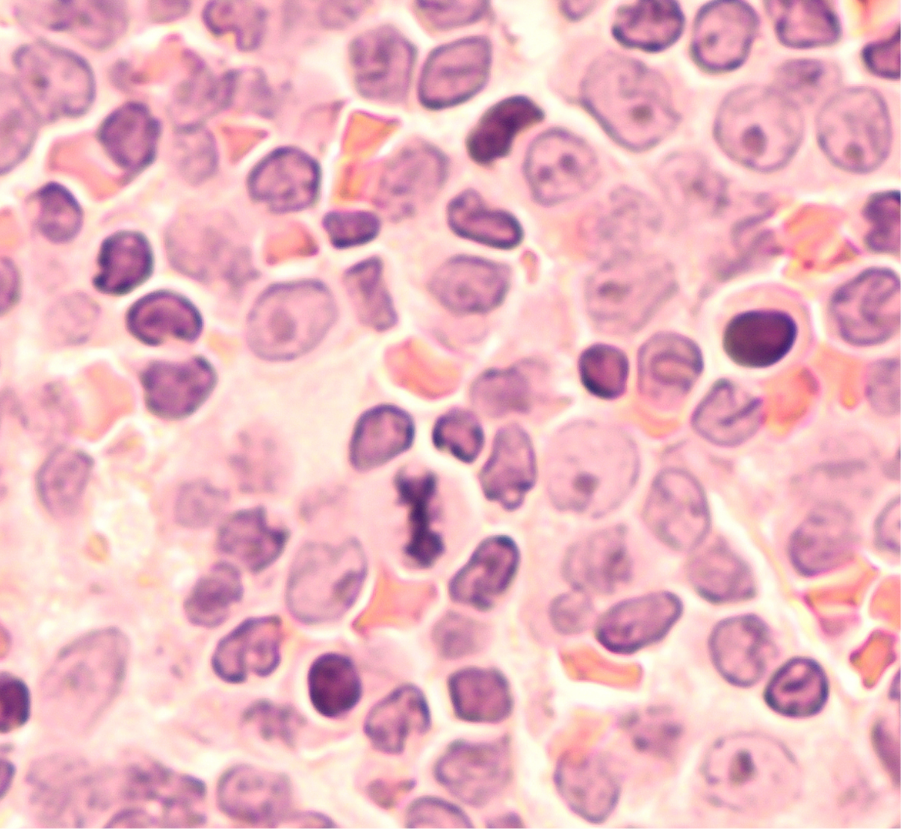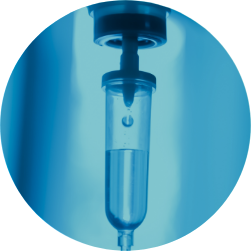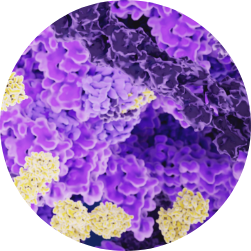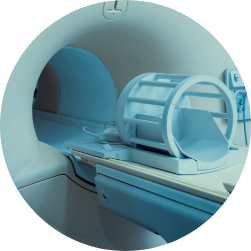

Follicular Lymphoma (FL) is a type of non-Hodgkin indolent lymphoma that affects the cells of the immune system.2
B cells, T cells and glands called lymph nodes make up the body’s immune system which protects the body from diseases.3 Sometimes, the cells inside a lymph node can grow abnormally and become cancerous. Patients with Follicular Lymphoma cancer have abnormal (cancerous) B cells that develop in clumps called ‘follicles’ inside the lymph nodes, and potentially other parts of the body. Follicular lymphoma cancer symptoms include swollen lymph nodes in neck, armpit, abdomen, or groin.2



Chemotherapy often consists of a combination of several medications which help to stop the spread of fast-growing cancer cells.4

A type of treatment where specific parts of the cancer cells is identified and blocked to prevent them from spreading.5 It is often used alone or in combination with other therapies, such as chemotherapy or radiation therapy.

Patient’s immune system is enhanced using medicines to better recognize and treat cancer cells.6 Examples include immune checkpoint inhibitors, immune system modulators, monoclonal antibodies, and T-cell therapy.
CAR-T cell therapy is a type of immunotherapy used to treat cancer with altered immune cells. These specially altered white blood cells, called T cells, are modified to find and stop the spread of cancer cells in the body.9

High-energy radiation is used to treat cancer cells. It is an important step before a bone marrow or stem cell transplant.7

Impaired or diseased bone marrow is replaced with healthy cells from the patient’s own bone marrow or form a suitable donor.8
Learn more about CAR-T cell therapy, an innovative form of immunotherapy for ALL, DLBCL and FL patients whose current treatment may not be responding, or whose cancer has relapsed.9, 10
CAR-T therapy involves altering your body’s own T cells, a type of white blood cell found in the immune system, with new chimeric antigen receptors (or CAR for short). When the CAR is combined with your T cells, the CAR-T cell therapy enhances the body’s natural ability to treat cancer with reprogrammed T cells.9 Thus, having the potential to cure the cancer completely with a one-time treatment. Click on the video to learn more.
since the first FDA approved therapy was made available in 2017.11,12
CAR-T cell therapy is an individualized treatment made from the body’s own T cells. However, data shows that T cell health will decline over time and result in poorer outcomes especially when additional therapies such as chemotherapy have been performed.13
Potentially curative treatment for
patients who are not responding well
to initial treatments
Harnesses the power of your own
T cells to detect and treat
cancerous B cells
A one-time infusion treatment
either with or without
hospitalization

CAR-T cell therapy is a one-time, potentially curative, and innovative treatment option. It is approved worldwide (by the FDA since 20177 and over 30 other health authorities) for patients who have certain types of leukemia and lymphoma, including Pediatric Acute Lymphoblastic Leukemia (pALL), Diffuse Large B-cell Lymphoma (DLBCL), as well as Follicular Lymphoma (FL) in 2022.9, 10
While the goal of CAR-T cell therapy is long-term recovery of cancer, it is important to note that not all patients will respond the same way to Follicular Lymphoma treatment.

(2021). Lymphoma – Non-Hodgkin: Subtypes. Cancer.Net. https://www.cancer.net/cancer-types/lymphoma-non-hodgkin/subtypes
Lymphoma Action. Follicular lymphoma. Lymphoma Action. (2022). Retrieved October 11, 2022, from https://lymphoma-action.org.uk/types-lymphoma-non-hodgkin-lymphoma/follicular-lymphoma
Treating B-cell non-Hodgkin lymphoma. (n.d.). Cancer.Org. Retrieved October 11, 2022, from https://www.cancer.org/cancer/non-hodgkin-lymphoma/treating/b-cell-lymphoma.html
Chemotherapy for acute Lymphocytic leukemia (ALL). (n.d.). Cancer.Org. Retrieved March 11, 2022, from https://www.cancer.org/cancer/acute-lymphocytic-leukemia/treating/chemotherapy.html
Targeted therapy for acute Lymphocytic leukemia (ALL). (n.d.). Cancer.Org. Retrieved October 11, 2022, from https://www.cancer.org/cancer/acute-lymphocytic-leukemia/treating/targeted-therapy.html
Immunotherapy for acute Lymphocytic leukemia (ALL). (n.d.). Cancer.Org. Retrieved October 11, 2022, from https://www.cancer.org/cancer/acute-lymphocytic-leukemia/treating/monoclonal-antibodies.html
Radiation therapy for childhoodleukemia.(n.d.).Cancer.Org.RetrievedMarch11,2022,from: https://www.cancer.org/cancer/leukemia-in-children/ treating/radiation.html
Stem Cell Transplant: Pioneering cancer therapy. (n.d.). Novartis. Retrieved October 21, 2022, from https://www.novartis.com/research-development/technology-platforms/cell-therapy/car-t-cell-therapy-and-beyond/car-t-cell-therapy-pioneering-cancer-therapy
CAR-T cell therapy: Pioneering cancer therapy. (n.d.). Novartis. Retrieved October 21, 2022, from https://www.novartis.com/research-development/technology-platforms/cell-therapy/car-t-cell-therapy-and-beyond/car-t-cell-therapy-pioneering-cancer-therapy
FDA approves Novartis Kymriah® Car-T cell therapy for adult patients with relapsed or refractory follicular lymphoma. Novartis. (2022, May 28). Retrieved October 20, 2022, from https://www.novartis.com/news/media-releases/fda-approves-novartis-kymriah-car-t-cell-therapy-adult-patients-relapsed-or-refractory-follicular-lymphoma
Pharma,K.(2021).Yescarta Patient Brochure – extracted from Novartis resource
Novartis. (n.d.). Kymriah Patient Numbers – extracted from Novartis resource
Novartis. (2021). Kymriah Real-World Evidence Summary – extracted from Novartis resource
Kymriah® (tisagenlecleucel), first-in-class CAR-T therapy from Novartis, receives second FDA approval to treat appropriate r/r patients with large B-cell lymphoma. (n.d.). Novartis. Retrieved March 11, 2022, from https://www.novartis.com/news/media-releases/kymriah-tisagenlecleucel-first-class-car-t-therapy-from-novartis-receives-second-fda-approval-treat-appropriate-rr-patients-large-b-cell-lymphoma
Helwick, C. (2016). Early Relapse in Follicular Lymphoma: Clinical Trial Data May Guide Management Decisions. The ASCO Post. https://ascopost.com/issues/september-10-2016/early-relapse-in-follicular-lymphoma-clinical-trial-data-may-guide-management-decisions/
Surveillance, Epidemiology, and End Results (SEER) Program. Cancer Stat Facts: NHL – Follicular Lymphoma. Bethesda, MD: National Cancer Institute (NCI); April 2021:1-8.
Novartis. (2022). Kymriah FL Disease State Training. – extracted from Novartis resource
Disclaimer:This is global website for information on CAR-T Cell Therapy and is intended for Patients and Caregivers outside the US. The information on the site is not country specific and may contain information that is outside the approved indication in the country in which you are located.